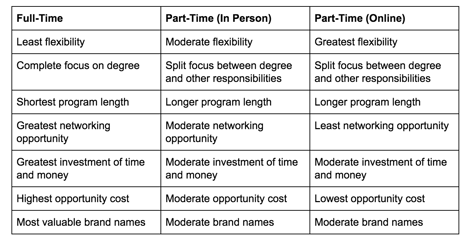Knowing the type of graduate school program that fits with your lifestyle and career goals is a critical part of the decision process. In some cases, you may consider multiple program types based on cost, time commitment, and career fit. However, it’s important to narrow down your options to the solutions that will work best for you. Don’t waste time considering programs that simply aren’t a good fit.
For a quick comparison of program types, see Figure 1 at the end of this article. Otherwise, read on...
Program Types
Full-Time Programs
Full-time graduate programs represent the standard educational model whereby the student learns in a full-time academic environment. Most full-time programs are extremely rigorous and won’t allow for a full-time job in addition to school (if they did, you would miss quite a bit of experience, anyway). Full-time programs are best for applicants that are looking for an immersive educational environment where they can dedicate their time to the subject matter.
In addition, full-time programs are great for those looking to change careers because students will spend a significant amount of time focused on learning a new discipline and networking with colleagues, professors, and companies. Lastly, multi-year, full-time programs (e.g., MBA, PhD, Law, MD) often provide opportunities for direct career experience during summer, spring, and fall internships.
Best when:
- You’re an early career applicant (less than a handful of years out of school)
- You want to change careers
- You’re seeking deep academic understanding or you want to perform research
- You want to pursue a strong networking opportunity
Considerations:
- Significant investment of time and money (make sure the ROI is there)
- Opportunity cost
Part-Time Programs (In Person)
Often, the further you move into your career the more challenging it is to attend graduate school full-time As such, part-time options can provide you with the best of both worlds: maintain your full-time job and advance your career with a graduate degree. By going the part-time route, you don’t give up your place in the career advancement line and you may be able to get your company to pay for some of your schooling through tuition reimbursement or financial sponsorship.
Part-time graduate school applicants generally don’t have the opportunity to try new careers or functions during summer internships, so this route is best for those looking to pursue a similar or adjacent career post-graduation. The challenge with part-time programs is maintaining your focus when you have other daily responsibilities over the course of a multi-year academic commitment. However, you often have the chance to choose between weekend, weekday, or monthly classes, which can help you accommodate your existing schedule.
Best when:
- You’re a mid to late career applicant
- You’re not changing functions (but maybe you are changing industries)
- You have high career opportunity cost (you can’t or don’t want to leave your current job)
Considerations:
- Balancing work and school
- Fewer opportunities for engagement outside the classroom
- Earning the same degree takes longer than it would in a full-time program
Part-Time Programs (Online)
Just a decade ago, online programs were treated like the kid brother of graduate school. But, recently, that has changed. Online programs are now a much more significant part of the graduate school landscape thanks to their superior flexibility, improved technology, and enhanced program experiences. The fact that several well-respected schools have now tossed their hat in the ring of online programming speaks to the demand for these new programs.
Online programs are truly built for the modern graduate student. With a part-time, online program, students are able to take self-guided classes at their own pace or maintain a virtual classroom setting by taking online courses at scheduled times. Some of the key factors to look at when selecting online programs are reputation, cost, and learning style.
Nearly all graduate programs will provide the subject matter information you need, however, only certain programs have the right reputation and the credentials that matter when it comes to career progression. Find out what accreditation is important in your subject area and find programs that meet those needs. Online graduate programs run by reputable colleges and universities tend to be a good bet.
A Mercedes is more costly than a Toyota for a reason. They are both solid cars that can get you from one place to another, but one provides more brand cache and certain luxury features not offered by the other. Figure out what matters to you and seek programs that offer the features you need at a price you feel comfortable with.
Lastly, find the learning style that works for you. Some programs mimic an in-class environment where you engage in online courses as a cohort and other programs are self-guided. Figure out which program type is best for you in terms of maintaining engagement and getting the most out of the program.
Best when:
- Flexibility is your #1 priority
- Credentials and knowledge are more important than brand name
Considerations:
- Program reputation Lack of networking opportunities
- Earning the same degree takes longer than it would in a full-time program
There are hybrid programs that combine in-person and online aspects, which might also be a good fit for you. Those types of programs offer the best of both worlds: the flexibility of an online program with the peer engagement of an in-person, part-time program. Not every program offers a hybrid option, but those options are becoming increasingly popular. As you are thinking about the various graduate school program types, there are several things to keep in mind.
For a summary of the three program types and how to choose one, click the link.
Factors to Consider
Consider Opportunity Cost
The concept of opportunity cost is important to understand when thinking through different types of graduate school programs. You can define opportunity cost as the value of the next best alternative when a given opportunity is chosen. The opportunity cost is what you lose out on by choosing one path over another.
To illustrate this point, let’s assume you have a job making $50,000 per year. If you decide to go to graduate school full-time, your opportunity cost, in its most simplistic form, would be the cost of giving up your full-time job: $50,000 a year. If you were due for a raise or might have gotten a promotion during your graduate school years, then those are opportunity costs too.
Conversely, there is an opportunity cost of not going to school, which would be the future earnings obtained with that graduate degree. The lack of clarity around the future impact of graduate school makes the decision so complicated that we have an entire article dedicated to that subject alone.
Be Introspective
The graduate school application process is a transformational phase in your career; you should be very thoughtful about the process and take it seriously. Prior to determining what program type is right for you, perform an assessment of your goals, family situation and career trajectory.
Ask yourself some critical questions, including: How important is graduate school to me? How does my current family situation impact my program type, if at all? Where am I in my career and am I willing to take a pause for graduate school? What kind of networking and peer engagement am I looking for in my graduate school experience? How important is cost and flexibility in my graduate school program?
Seek feedback
This point has a caveat. You should seek feedback from reputable sources. School admissions staff are a great example, because they're knowledgeable and motivated to get applicants into the right program. If you share information with them about your background and goals, they will generally send you in the right direction.
In addition to speaking with school representatives, you should also speak with people who are in the career you’re pursuing. Ask them how they would perceive the degree you’re seeking. Is the degree critical for their job? What about part-time versus full-time? Start with your career end goal, find the people that are doing that, and seek feedback on the type of program that will help you get there.
Stick to your guns
Once you have thought about what you want and received feedback on how to get there, stick to your guns. Applicants tend to get pushed off track by the sheer volume of information that’s out there, not to mention conflicting advice. Everyone has an opinion on what you should do, however, even those with the best intentions may not know what they’re talking about. If you’ve done the research and really thought about it, you should feel comfortable in your decision about program type.
As always, try an remain open to feedback, but don’t hesitate to stand your ground about the program type you’ve chosen. The graduate school landscape has become more complicated with each new variation on program type. But you should feel comfortable knowing that there is a program type out there for you; it’s just a matter of finding the right one. Think about what program is the best fit for your career goals, do your research, and don’t look back.
Still not sure about program type? Check out this video: Choosing a Program Type — Factors to Consider
Figure 1. Program Type Comparison Table




Leave a Comment